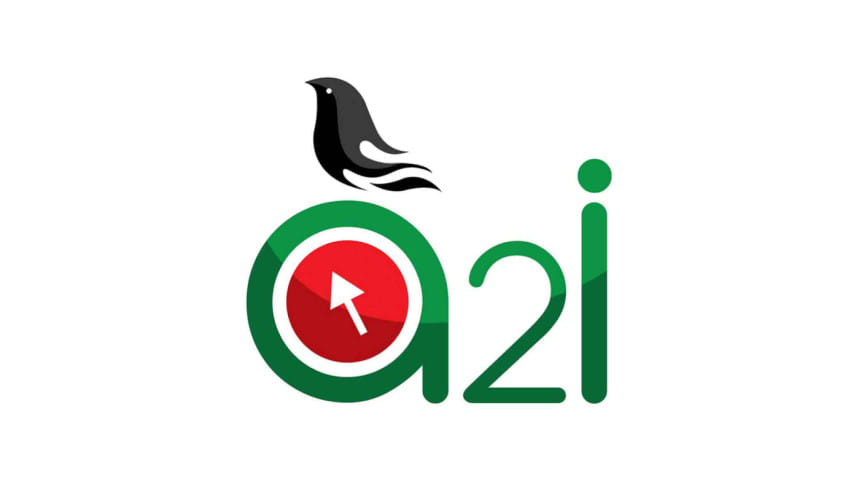a2i set to enter digital innovations sector as agency, tech companies worry

The government's a2i programme is set to become a full-fledged agency, entering the software and digital innovations industry as a government-subsidised player, but creating uncertainty for local tech companies.
The cabinet earlier this month approved in principle the Agency to Innovation (a2i) Act 2021 -- a draft legislation that proposes to turn the a2i (Aspire to Innovate) programme into an agency called Agency to Innovation.
In response to the proposed legislation, major industry stakeholders have written to the government and communicated their fear that the subsidised national entity would emerge as a market giant and outcompete local tech companies.
The overall objective of the a2i programme -- a foreign donor-supported project housed at the Prime Ministers' Office -- is to innovate and digitise public services.
The programme supported the digitisation projects across the government, totalling Tk 950 crore, funded primarily by the United Nations Development Programme.
The draft law proposes that the a2i be turned into an agency empowered to accept any project or provide any consultancy needed to "establish an educated society, where technological innovations can flourish to develop citizen-friendly services".
This essentially means that a2i will become a tech agency operating similarly to any tech company with one major difference -- it will be bankrolled or subsidised by the government.
According to the proposed law, government grants, donations and support will be major sources of funding for the agency, in addition to international grants, consultancy fees, income from services, and "income from own sources".
The agency will also lease out its infrastructure and use its capital for investment and trading.
Each year, the agency will present a budget to the government detailing its financial demands.
The money taken from the government will be used as per its regulations, but the rest of the capital will be utilised in any way the management sees fit.
All staffers of the agency will be public servants, according to the draft legislation.
Several tech industry leaders, all speaking anonymously, said a government-subsidised institution with limited overhead or infrastructural costs will outcompete private players.
On April 21, 2022, five major tech associations wrote a letter to the state minister of Information, raising alarm. The associations are Bangladesh Association of Software and Information Services (Basis), Bangladesh Computer Samity, e-Commerce Association of Bangladesh (eCab), Internet Service Providers' Association of Bangladesh and Bangladesh Association of Call Centers and Outsourcing (Bacco).
The letter stated that certain provisions in the law directly conflict with the business interests of the private sector.
The letter was in response to an earlier draft of the proposed law, but most of the areas of concern pointed out remain either intact, or in similar phrasing, in the finalised proposed act approved by the cabinet.
"It has been a long-standing demand to give local tech companies preferential treatment in getting government gigs and international donor projects. If a2i itself becomes a service provider and consultant, it will become a competitor to private companies," said the letter.
The finalised bill states that services and consultancies will be provided to establish "partnerships" with local and international actors.
It also states that the management will permit joint ventures and partnerships between individuals, firms, companies, and other private and government establishments.
About this provision, the tech associations' letter states that a2i is being given permission to form multiple companies and directly participate in business, which is not "expected of them".
"This will ruin the scope of business for local tech companies," said the letter.
"From the very beginning, the a2i has been providing consultation and executing projects for all ministries and government institutions, as an expert or technical committee. If they now create their own companies and implement those business ventures, this will completely conflict with public procurement."
The bill empowers the a2i to earn fees by providing services and consultancies. "By this we understand IT consultation. The usage of these two terms [services and consultancies] creates a risk of a2i's participation and interference in all public procurement," it added.
Concerns over "the risk of interference" are compounded by the fact that the bill allows the chair of a2i to empower any officer of the organisation with any power or responsibility it sees fit.
The letter also states that that creates space for the chair to empower individuals based on his or her personal likes and dislikes. "There is a concern about how fair and impartial they can remain."
An analysis of the procurement of 41 services over the last decade shows that one software firm -- SoftBD Ltd -- got 34 percent of the work (14 contracts). Another firm, Orange BD, got 15 percent of the work (six contracts).
Only 14 out of the 41 contracts were given to vendors, who got one gig each.
A2i's Project Director Dewan Muhammad Humayun Kabir said impartiality would not be a concern.
"When we first started out, there were not many firms who could qualify to bid in the projects. This scenario is fast changing. There will be no concerns about impartiality in procurement."
He also said the involvement of the private sector will be ensured. "Out of the Tk 950 crore worth of work we got, we had procured Tk 200 crore of software from the private sector.
"We cannot remain a donor-funded programme. This renders us unable to take on many projects that are needed for the good of the public," he added.
When wrapping up its second phase of funding the a2i, the UNDP final project review report stated the same -- that a2i needs to be set up as an institution.
"Due to lack of institutionalisation, the entire functionality and modality of the activities of the project goes through a significant risky nature of work," said UNDP.
In order for the successful continuation and upgradation of the current initiatives along with initiation of new activities, institutionalisation is essential, it concluded.
"The scope of a2i's work needs to be defined. The a2i can be given work related to national safety, security of the country and citizens, for example. Some of the digitisation work should be done by agencies within the government," said Dr Khondaker Golam Moazzem, research director at Centre for Policy Dialogue.
"However, if they can participate in competitive bidding processes for all kinds of jobs along with the private sector, there is a risk of them creating unfair competition. Most of the tech companies are small to medium companies -- they might not be able to compete with a2i."
He added, "Procurement processes are not transparent, so it would be difficult to know if they are enjoying undue advantage."

 For all latest news, follow The Daily Star's Google News channel.
For all latest news, follow The Daily Star's Google News channel. 








Comments